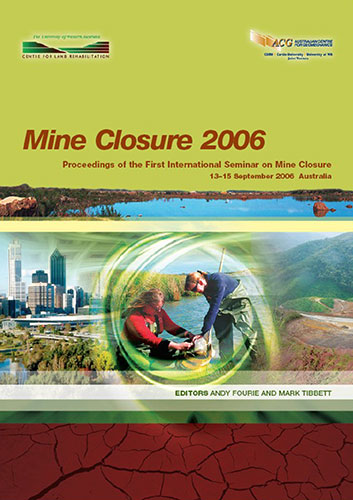Optimising the Erosional Performance of Store and Release Covers through Appropriate Landform Design

|
Authors: McPhail, G; van Koersveld, A |
DOI https://doi.org/10.36487/ACG_repo/605_47
Cite As:
McPhail, G & van Koersveld, A 2006, 'Optimising the Erosional Performance of Store and Release Covers through Appropriate Landform Design', in AB Fourie & M Tibbett (eds), Mine Closure 2006: Proceedings of the First International Seminar on Mine Closure, Australian Centre for Geomechanics, Perth, pp. 549-557, https://doi.org/10.36487/ACG_repo/605_47
Abstract:
Increasingly store and release covers are being provided to tailings, waste rock and heap leach facilities as part of the closure design with the purpose of controlling percolation of rainfall runoff through these facilities. While the focus in design is on the specification of the cover with respect to percolation performance, the success of the cover over the long term is highly dependent on erosional stability. But erosional stability is more than a question of maintaining cover thickness. As importantly, it is about ensuring that gulley formation within the cover as a result of rainfall runoff does not cut through the cover and expose the underlying tailings or rock materials, for it is at that stage that the cover could be regarded as having failed. Long term landform modelling provides a useful engineering tool for assessing cover erosional performance especially where the model is able to simulate gulley formation. SIBERIA is one such model that has a proven track record. But it is the ability to carry out landform modelling in conjunction with landform engineering based on digital terrain models that ultimately provides the means to engineer for optimal cover performance beyond cover thickness determination. This paper presents the results of the evaluation of a range of landform geometries and their performance using SIBERIA with the aim of developing broad guidelines on ways to maximise erosional performance of store and release covers through careful landform design. Both waste rock dumps as well as tailings storage facilities (TSF’s) are considered.
References:
Willgoose, G.R. (2006) Personal communication.
Willgoose, G.R. and Riley, S.J. (1998) Application of a catchment evolution model to the prediction of long term
erosion on the spoil heap at Ranger Uranium Mines: Initial analysis. Canberra, Australian Government
Publishing Service. Supervising Scientist Report 132.
Landform Stability
Mine Closure 2006, Perth, Australia 557
© Copyright 2026, Australian Centre for Geomechanics (ACG), The University of Western Australia. All rights reserved.
View copyright/legal information
Please direct any queries or error reports to repository-acg@uwa.edu.au
View copyright/legal information
Please direct any queries or error reports to repository-acg@uwa.edu.au